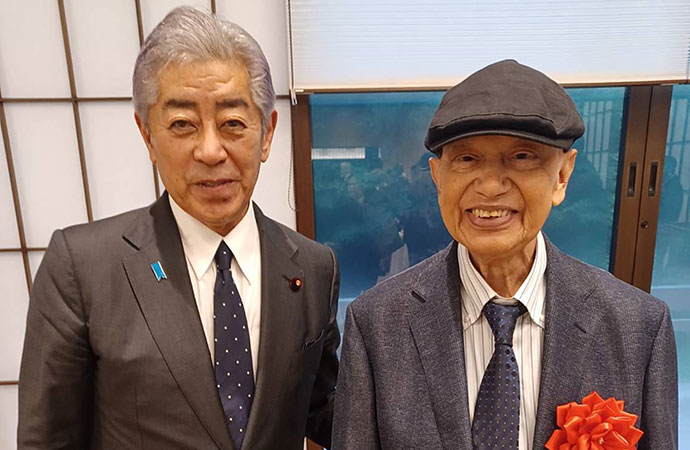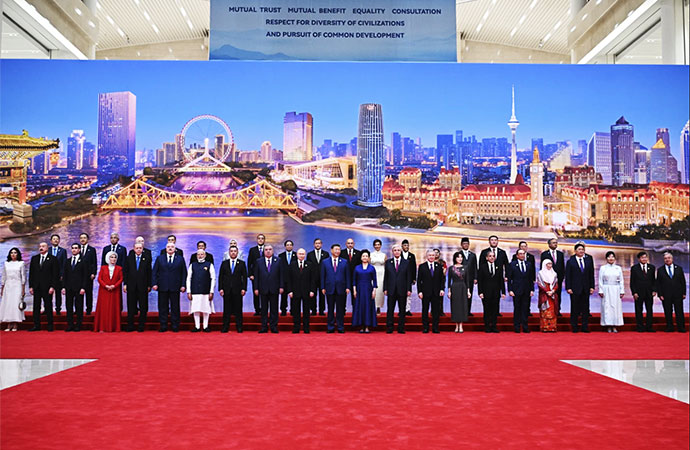Reportage

An intimate moment with FM Iwaya Takeshi after the official ceremony
Monzurul Huq is well known among readers of Prothom Alo, Dhaka Courier and UNB news reports as a leading source of information in Bangladesh about Japan. Besides serving as Tokyo Bureau Chief of Prothom Alo, he has been a regular contributor to the weekly news magazine Dhaka Courier and has also reported for UNB.
During his long stay in Japan, spanning more than three decades, he has written extensively on major issues facing the country and contributed to other renowned Bangladeshi publications, including Kali-o-Kolom, the country's leading magazine on literature, art and culture. In recent years, he even published a periodic column in one of Japan's widely read national dailies.
All these achievements as a journalist and author, however, remained less publicised in today's era of self-promotion through online blogs and digital platforms, as he prefers to stay outside the noise of that hype.
Despite his preference for working quietly, his contribution attracted the attention of those seeking high-quality journalism rooted in authenticity and in-depth knowledge. The Japanese government has now recognised him as the first recipient of the Foreign Minister's Commendation among all foreign correspondents stationed in Japan to date. This recognition itself is significant, given that Japan hosts foreign reporters from almost all the world's leading media outlets.
Each year the Japanese government selects and announces a list of individuals, organisations and retired foreign ministry officials for the award, commonly known in Japan as the Foreign Minister's Commendation. The list usually includes those who have made significant contributions in promoting Japan's relationship with other nations and serves as an important recognition of their role in deepening the understanding of societies, cultures and histories.
The names typically include high-profile figures, as well as individuals and groups who, while remaining out of the limelight, have meaningfully advanced people-to-people understanding between Japan and other countries.
The fact that this year the Ministry of Foreign Affairs of Japan decided to include foreign correspondents among the recipients of this prestigious honour-and chose a Bangladeshi journalist as the very first awardee in this category-can rightly be seen as an honour for Bangladesh itself.
The honour list is divided into several categories, led by individual names followed by groups, organisations, think tanks and related bodies. Another category highlights contributions made by retired Japanese diplomats and diplomatic staff.
Interestingly, a sub-category within this group includes Japanese chefs who served in overseas missions and contributed significantly to promoting Japanese food culture abroad. Recognising these chefs each year not only values their contribution but also encourages young aspirants to pursue this profession.
This year, commendations were awarded to 173 individuals and 58 groups-of which 18 individuals and 7 groups reside in Japan, and 155 individuals and 51 groups overseas. Most of those residing in Japan attended the award ceremony on September 5 at the official guest house of the Ministry of Foreign Affairs.
For others, the commendation certificate and accompanying gift will be handed over at events organised by Japanese embassies and consulates in respective countries. Besides honouring outstanding international achievements, the commendations also aim to foster public understanding and support within Japan for the work of the recipients.
September 5 proved highly inconvenient for Tokyo commuters as heavy downpours and a passing typhoon engulfed the city until late afternoon. Despite the weather, all individual and group recipients reached the venue on time. The ceremony began with the arrival of Japan's Foreign Minister, Iwaya Takeshi. After a brief introduction by the moderator, outlining the significance of the event, the Foreign Minister delivered his official address, thanking recipients for their contributions to deepening global understanding of Japan.
He expressed hope that their work would encourage others while motivating recipients themselves to refine their own efforts further. He also highlighted the categories and contributions recognised this year before proceeding to the central podium to distribute commendation certificates personally, reading each citation aloud before handing over the award.
The grand ceremony was followed by a reception, where participants had the chance to exchange views informally with the Foreign Minister. The Bangladeshi awardee, joined by his spouse, also enjoyed ample time to converse with the minister, who thanked Monzurul Huq once again for helping the people of Bangladesh better understand Japan through more than three decades of journalistic work. He expressed hope that, despite facing health challenges, Huq would continue setting new examples of objective reporting on Japan for Bangladeshi readers.
Alongside the certificate, each recipient received a gift: a piece of cloth traditionally used as a wrapping material for valuable items. Designed with motifs popular during the Muromachi period (1336-1573), it is highly praised for its attractive design and durability. The Muromachi era, which lasted over two centuries, witnessed significant cultural growth under the influence of Zen Buddhism.
Despite political instability, it is remembered for social change and cultural flourishing. The accompanying gift, therefore, also serves as a symbolic reminder of Japanese history and culture-rightly regarded as a valuable asset in itself.

























Leave a Comment
Recent Posts
Religion and Politics: A Toxic ...
At Dhaka University, cafeteria workers have been told not to wear shor ...
Enayetullah Khan joins AsiaNet ...
AsiaNet’s annual board meeting and forum was held in Singapore, ...
In a New York minute
Many leaders back a UN call to address challenges to ..
Defaulted loans at Non-Bank Financial Institutions ( ..
How the late Zubeen Garg embodied cultural affinitie ..